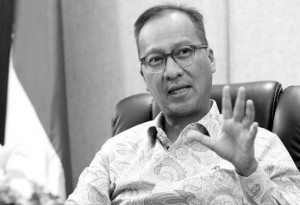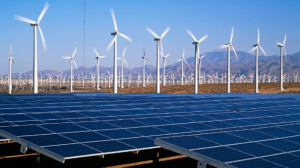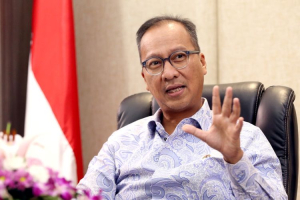Saleh Husin says palm oil downstreaming key to avoiding Middle income trap
Former Minister of Industry Saleh Husin has underscored the crucial role of palm oil downstreaming in preventing Indonesia from falling into the middle-income trap.
His insights are detailed in his latest book, Hilirisasi Sawit Cegah Middle Income Trap ("Palm Oil Downstreaming to Prevent the Middle Income Trap"), which was launched on Wednesday, October 9, 2024, at the Digital Industry Center (PIDI) 4.0 building in Jakarta.
The book explores strategies for palm oil downstreaming to strengthen Indonesia’s national economy and enhance its bargaining power in the global market.
Saleh said that his doctoral dissertation at the University of Indonesia revealed several critical aspects of palm oil downstreaming, including a production target of 100 million tons annually and the potential to generate US$100 billion (Rp1,560 trillion) in export revenue.
He also emphasized the need to counter negative campaigns against palm oil, which are often spread by developed countries.
A key point in the book is how palm oil downstreaming can help prevent Indonesia from being trapped in the middle-income status. Saleh pointed out that palm oil is a major export commodity for Indonesia, generating US$30 billion (Rp462 trillion) in annual exports.
However, he criticized the fact that Indonesia, despite being a leading producer, does not have control over palm oil pricing.
"It's very strange. We dominate the product, but others set the price," Saleh said at the book launch.
He further elaborated on the economic benefits of palm oil downstreaming, such as the use of B35 biodiesel, which could save the country up to Rp161 trillion in foreign exchange and create jobs for around 18 million people.
Additionally, he said, the downstreaming process supports Indonesia’s efforts to achieve its Net Zero Emission (NZE) goals, with an estimated potential to reduce 35 million tons of CO2.
Saleh expressed hope that his book would significantly contribute to the development of Indonesia’s palm oil industry, stressing the importance of maintaining palm oil as a strategic commodity. He cautioned against letting it fade into obscurity like the country’s once-flourishing spice trade.
"I hope the palm oil industry doesn’t end up like spices, which thrived in the 15th and 16th centuries but are barely heard of today," Saleh said.
Minister of Industry Agus Gumiwang Kartasasmita, who attended the book launch, projected that the economic value of the palm oil sector, from upstream to downstream, will reach Rp775 trillion in 2024, surpassing previous years.
Agus also noted that the palm oil processing industry contributes approximately 3.5 percent to Indonesia's GDP. He emphasized the need for a comprehensive downstreaming strategy to fully realize the sector's potential.
Minister of Transportation Budi Karya Sumadi, who was also present, highlighted the potential of palm oil-based biojet fuel (bioavtur) as part of the downstreaming efforts.
Bioavtur is expected to play a vital role in the future of aviation, with mass use projected by 2060.
Tag
Already have an account? Sign In
-
Start reading
Freemium
-
Monthly Subscription
30% OFF$26.03
$37.19/MonthCancel anytime
This offer is open to all new subscribers!
Subscribe now -
Yearly Subscription
33% OFF$228.13
$340.5/YearCancel anytime
This offer is open to all new subscribers!
Subscribe now






